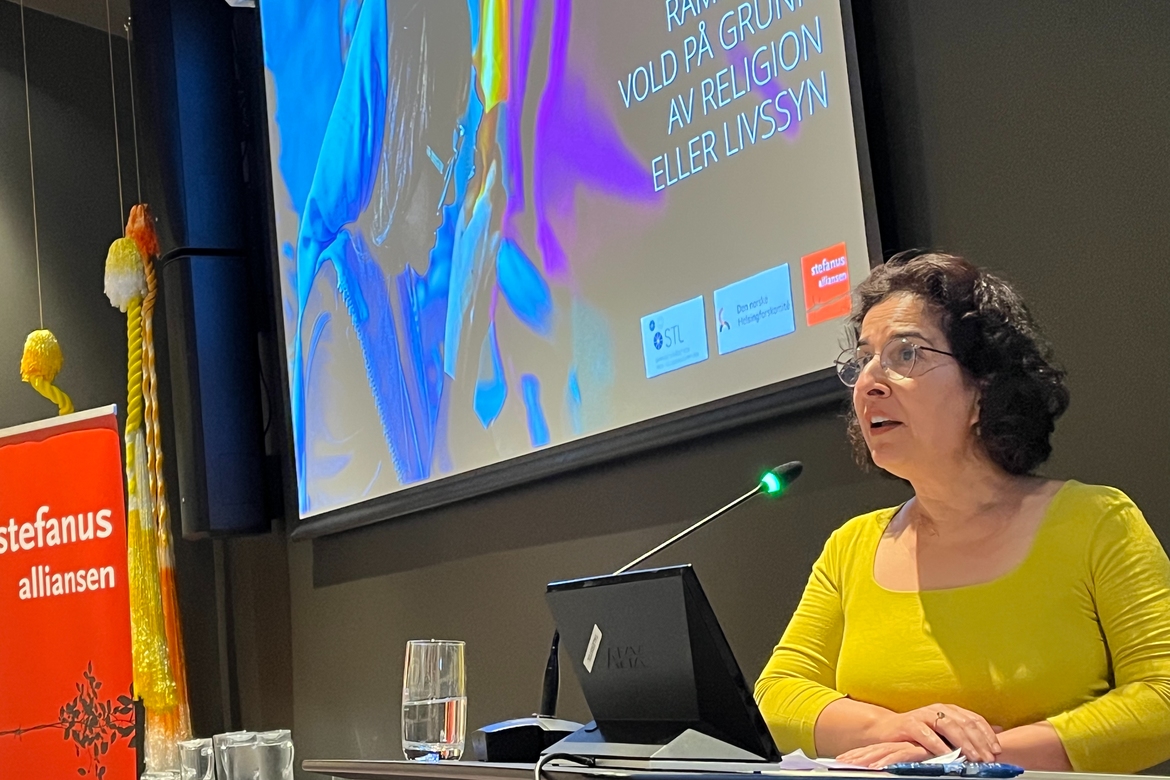Persecution of Christians Intensifies in Iran
The Ayatollah regime in Iran arrests Christians, confiscates Bibles, and monitors and threatens Christians.

Nazila Ghanea, the UN Special Rapporteur on Freedom of Religion or Belief, is herself a Bahá'í from Iran. She protests against the abuses against Christians in the country.
Article and photo by Johannes Morken. Originally published on stefanus.no February 19th 2024.
The Iranian regime under the Ayatollah's leadership has intensified its crackdown on Christians, with alarming waves of arrests, Bible confiscations, and relentless monitoring and intimidation tactics. This persecution extends not only to Christian converts, potentially numbering up to one million, but also impacts members of the Christian Armenian and Assyrian minorities. Despite being recognized religious communities, they face severe repercussions if they support converts or conduct services in Persian.
In the tumultuous year of 2023, 166 Christians were arrested, marking a disturbing trend of targeted detentions. Notably, these arrests occurred in concentrated waves, with over 100 individuals detained during the summer months and another surge around the Christmas season, following a relatively quiet first half of the year.
Faceless Victims
Although many detainees are eventually released after enduring rigorous interrogation and harsh imprisonment conditions, few are willing to publicly disclose their ordeal, fearing further reprisals. This has led to an increase in what can be termed "faceless victims" – individuals whose suffering remains hidden from public view. These have contributed to a recent annual report on the persecution of Iranian Christians titled "Faceless Victims.
The persecution of Christians in Iran is compounded by the distortion of their fundamental rights under the guise of vague charges such as "actions against national security." Nazila Ghanea, a Bahá'í scholar from Iran and the UN Special Rapporteur on Freedom of Religion or Belief, emphasized that the mere act of practicing Christianity or possessing Christian literature is deemed criminal by the regime.
The mere act of practicing Christianity or possessing Christian literature is deemed criminal by the regime.
Ghanea, a professor at an English university, is herself a Bahá'í from Iran. Bahá'ís, who face the same persecution as Christians from Muslim backgrounds, also experienced harsh waves of arrests in 2023.
The collaborative effort behind the "Faceless Victims" report, spearheaded by organizations such as Article18, Middle East Concern, CSW, and Open Doors – all partners of the Stefanus Alliance – sheds light on the systematic violations endured by Iranian Christians. The report's launch in London, attended by Fiona Bruce, the British government's special envoy for freedom of religion or belief, underscores the international concern over religious persecution in Iran.
The Regime under Pressure
- The Ayatollah regime in Iran is under increasing pressure from its own people. The regime is responding with arrests, harassment, and imprisonment, including of Christians who meet in house churches. The converts in Iran do not have a single legal church where they can meet. They meet in homes for Bible study, prayer, and fellowship. Networks of house churches are considered a threat to national security by the regime and are persecuted accordingly, says Johannes Morken of the Stefanus Alliance.
- In fact, a Supreme Court judge declared more than two years ago that house churches are not illegal and do not threaten national security. However, the regime continues to arrest Christians, accusing them, as before, of harming national security, Morken adds.
A Hunt for Bibles
Last year it became clear that the regime was targeting the distribution of Bibles. More than one-third of the Christians arrested had multiple Bibles. It is not known what has been done with the Bibles. However, it has been reported that confiscated Bibles are destroyed.
Many are released on bail after harsh interrogations. Many reports being forced to attend Islamic classes. Two individuals reported that they were threatened with seven years in prison if they attempted Islamic re-education. The "re-education" and pressure are a collaboration between the Intelligence Department and Islamic seminaries.
Surveillance and pressure
Although most are released after interrogation and pressure, their lives are never the same. They are under surveillance that often includes stressful and disturbing phone calls. The formerly detained Christians are reminded of the psychological torture they experienced in detention.
The surveillance that many Christians and other minorities face is becoming more sophisticated, including increased digital surveillance. Several house churches have been infiltrated by spies. Christians who have been arrested have been told during interrogations what their lives could be like if they "cooperate" by becoming spies among other Christians.
In several cases, Christians who have been released are brought back for new interrogations, with demands that they report on what they have done since their release. Many of those released have experienced isolation: even friends are afraid to associate with them for fear of being picked up by the police. Their fears are justified. People who have been arrested often lose their jobs, and their children are expelled from school.
This is the pressure under which Iranian Christians live, but with which various partners of the Stefanus Alliance help them. This help includes documentation, political advocacy, prayer and education.
Persecuted Christians in Iran, 2023 numbers:
- 166 arrested, 30 more than in 2022
- 103 in detention, 40 more than in 2022
- 22 sentenced to prison, slightly fewer than in 2022